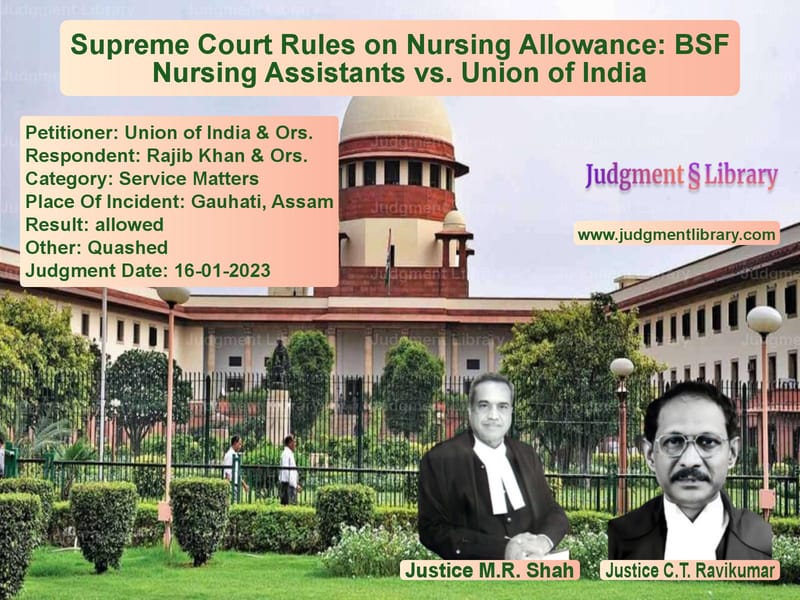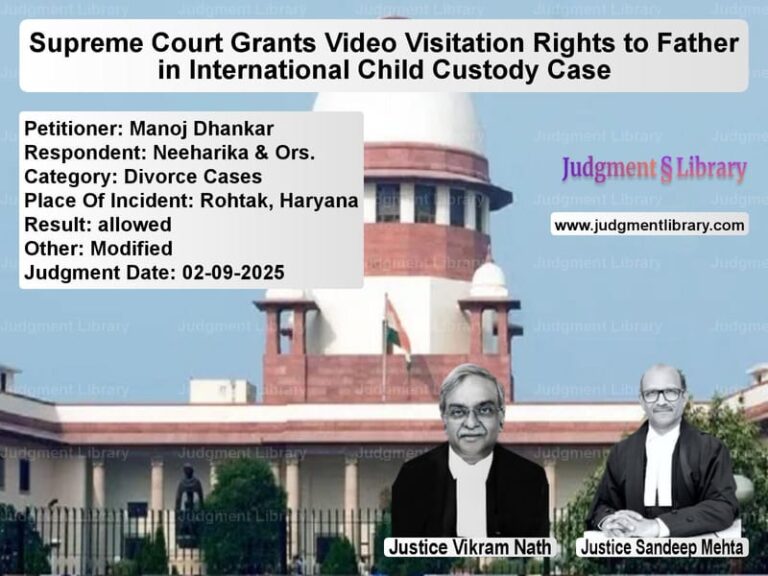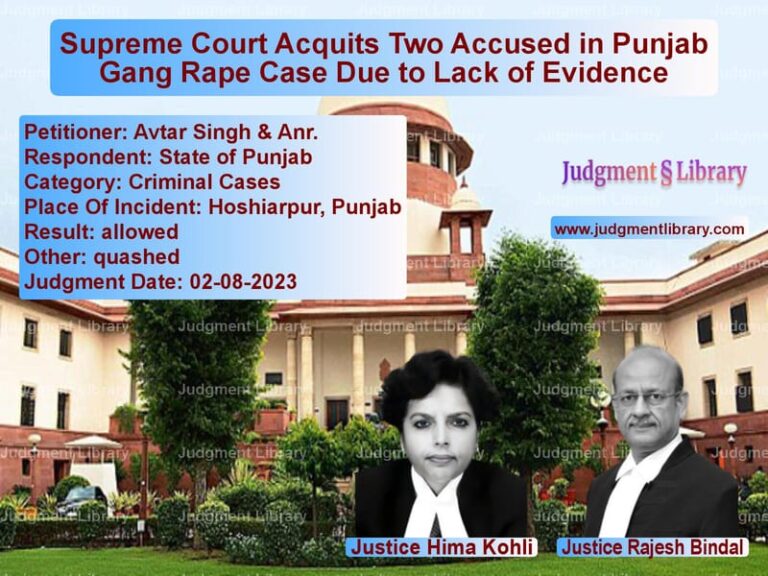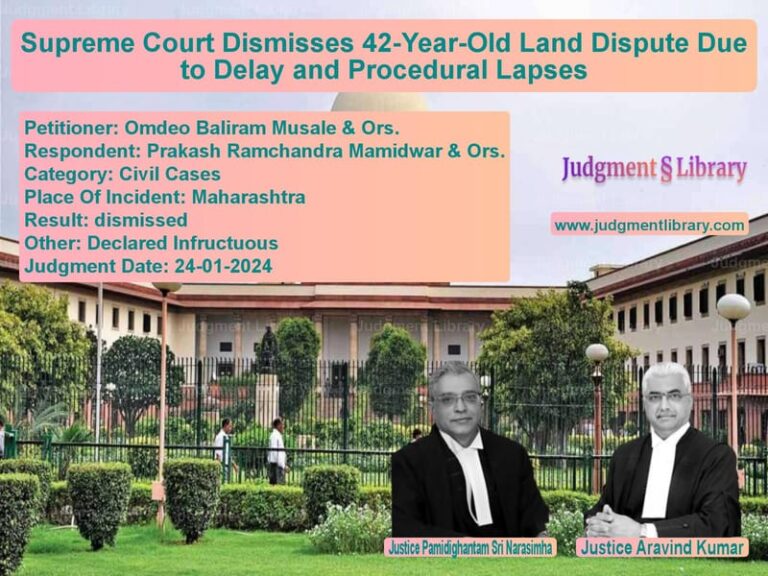Supreme Court Rules on Nursing Allowance: BSF Nursing Assistants vs. Union of India
The Supreme Court of India recently ruled in the case of Union of India & Ors. vs. Rajib Khan & Ors., addressing whether Nursing Assistants serving in the Border Security Force (BSF) are entitled to receive a Nursing Allowance at par with Staff Nurses. The case revolved around differences in educational qualifications, duties, and allowances granted under government policy.
Background of the Case
The dispute arose when Nursing Assistants in BSF hospitals filed a writ petition in the Gauhati High Court, seeking Nursing Allowance equivalent to that provided to Staff Nurses. They argued that their duties were similar to those of Staff Nurses and that denying them the allowance was discriminatory.
The High Court ruled in favor of the Nursing Assistants, holding that they were entitled to the Nursing Allowance. Dissatisfied with this ruling, the Union of India and other authorities filed an appeal in the Supreme Court.
Arguments by the Appellants (Union of India & Ors.)
- The appellants contended that educational qualifications and experience required for Nursing Assistants and Staff Nurses are significantly different.
- They pointed out that Staff Nurses undergo a four-year nursing course, whereas Nursing Assistants complete only a one-year training program.
- They argued that the High Court’s ruling contradicted established legal principles that allow pay differences based on qualifications and job responsibilities.
- They cited prior Supreme Court rulings affirming that differences in qualifications justify differences in pay scales.
Arguments by the Respondents (Nursing Assistants)
- The respondents argued that they performed the same duties as Staff Nurses and worked in similar conditions.
- They maintained that their responsibilities included patient care, administering medication, and assisting doctors, just like Staff Nurses.
- They contended that the classification between Staff Nurses and Nursing Assistants was unfair and arbitrary.
- They relied on the High Court’s observation that educational qualifications alone cannot be the basis for denying Nursing Allowance.
Supreme Court’s Observations
- “The classification of posts and determination of pay structure comes within the exclusive domain of the Executive, and courts should not interfere unless there is a violation of constitutional principles.”
- “The difference in educational qualifications, experience, and job roles justifies different pay structures.”
- “The Nursing Assistants in BSF do not hold the necessary nursing council registration required for Staff Nurses, further justifying the distinction.”
Final Judgment
- The Supreme Court allowed the appeal and set aside the High Court’s judgment.
- The Court ruled that Nursing Assistants are not entitled to Nursing Allowance at par with Staff Nurses.
- It reaffirmed that Hospital Patient Care Allowance provided to Nursing Assistants is sufficient and appropriate.
Legal Precedents Considered
- Punjab State Cooperative Milk Producers Federation Ltd. vs. Balbir Kumar Walia (2021): Upheld differences in pay structures based on qualifications.
- Director of Elementary Education, Odisha vs. Pramod Kumar Sahoo (2019): Recognized that job classification based on qualifications does not violate equality rights.
- Secretary, Department of Personnel & Public Grievances vs. T.V.L.N. Mallikarjuna Rao (2015): Confirmed that courts should not interfere with government policies on pay structures.
Implications of the Judgment
- The ruling establishes that educational qualifications are a valid basis for pay differentiation.
- It reinforces the government’s authority in determining pay structures and allowances.
- The decision prevents setting a precedent where employees in different roles claim equal pay solely based on similar job responsibilities.
Conclusion
The Supreme Court’s ruling in this case reaffirms the principle that differences in qualifications and experience justify differences in pay scales. The decision prevents the misinterpretation of pay equality and ensures that specialized allowances remain exclusive to those who meet the necessary educational and professional criteria. This judgment will have a lasting impact on similar cases concerning pay disparities in government services.
Petitioner Name: Union of India & Ors..Respondent Name: Rajib Khan & Ors..Judgment By: Justice M.R. Shah, Justice C.T. Ravikumar.Place Of Incident: Gauhati, Assam.Judgment Date: 16-01-2023.
Don’t miss out on the full details! Download the complete judgment in PDF format below and gain valuable insights instantly!
Download Judgment: union-of-india-&-ors-vs-rajib-khan-&-ors.-supreme-court-of-india-judgment-dated-16-01-2023.pdf
Directly Download Judgment: Directly download this Judgment
See all petitions in Employment Disputes
See all petitions in Public Sector Employees
See all petitions in Judgment by Mukeshkumar Rasikbhai Shah
See all petitions in Judgment by C.T. Ravikumar
See all petitions in allowed
See all petitions in Quashed
See all petitions in supreme court of India judgments January 2023
See all petitions in 2023 judgments
See all posts in Service Matters Category
See all allowed petitions in Service Matters Category
See all Dismissed petitions in Service Matters Category
See all partially allowed petitions in Service Matters Category







